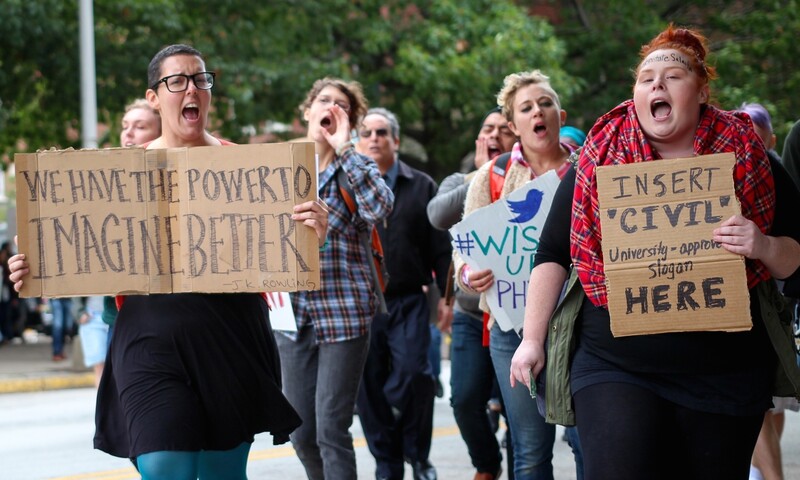4 December 2014

Students and faculty are determined to keep challenging University of Illinois administrators’ decision to fire Steven Salaita. (Jeffrey Putney/Flickr)
The University of Illinois is having difficulty hiring senior faculty. This is one of the negative consequences of administrators’ decision to summarily fire Steven Salaita last August.
Concern about the university’s ability to attract faculty was expressed in a letter to incoming president Timothy Killeen about the fallout from the Salaita case, signed by three dozen department heads.
The letter urges Killeen to reaffirm the university’s commitment to academic freedom, free speech and shared governance.
Salaita had been hired to a tenured position in the American Indian Studies program, but his job was revoked by Urbana-Champaign campus chancellor Phyllis Wise after pro-Israel faculty, students and donors complained about his criticisms of Israel’s attack on Gaza.
“While the possible negative effects on even junior searches remain to be seen, the Department of History has already abandoned a previously authorized senior search in US history this year in recognition of the bleak prospects of attracting suitable applicants in the current climate,” the letter states, noting that thousands of academics from around the world have pledged to boycott the university to protest Salaita’s firing.
There was also a dramatic eighty percent drop in the number of applicants in a search in the philosophy department compared with a similar hiring process last year, the letter reveals.
“To date, the fallout from the Salaita decision has been felt most acutely in programs throughout the humanities and social sciences,” write the department heads, who include American Indian Studies chair Robert Warrior, English department chair Michael Rothberg, history chair Diane Koenker and Matti Bunzl, director of the Program in Jewish Culture and Society.
But they warn that much worse is to come as the American Association of University Professors (AAUP) is likely to formally censure the University of Illinois in coming months.
“The harmful effects of a formal censure by the AAUP, a rebuke with very few precedents for an institution of our size and stature, would be felt far more widely across the entire campus than any of the current boycotts or the criticisms already registered by other professional associations and individuals,” the letter states.
The senior academics urge Killeen to begin to repair the damage by “explicitly and emphatically reaffirming the university’s commitment to an understanding of academic freedom and free speech that accords with AAUP policy statements on the subject, and to fundamental principles of shared governance … .”
“Such actions on your part would help send a strong message to our concerned colleagues across the nation and around the world that the University of Illinois remains committed to the values that help define a distinguished institution of higher learning,” the letter concludes.
The full letter can be read at the blog of Academe Magazine, which is published by AAUP.
Salaita has sued the university over its refusal to release records about his firing, in what is likely the first step in a long legal process.
Timothy Killeen, 62, a space scientist and vice chancellor of the State University of New York, will succeed retiring University of Illinois President Robert Easter, who publicly backed Salaita’s firing.





Comments
it's sweet that Univ of
Permalink karen replied on
it's sweet that Univ of Illinois is reasserting its verbal commitment to freedom of academic expression. That, in itself, is the very definition of "freedom of academic expression". hahahahaha!!!
however, the University has PROVEN its full PROHIBITION of freedom of academic HIRING. What department is going to go through that hiring process only to find out that they weren't FREE to hire who was best?
hypocrites.
Very good. It's nice to see
Permalink John replied on
Very good. It's nice to see the faculty of this university supporting Dr. Salaita. Hopefully even if they come out with this BS statement, the country and world's academics will see through the ruse and decide against working for, with, or supporting this institution. A nice way to learn a valuable lesson.
poison letter
Permalink Hugh Ekeberg replied on
Interesting how this whole episode has played out and how things have changed. After only one year we can see how the momentum for justice for Palestine has increased significantly.
Contributing to this momentum has been the trend in the #JSIL for Zionists to become more extremist and racist than ever before. Also heartening to see young Jews more willing to confront and challenge the Zionist propaganda their parents lapped up without question.
All this has created a positive atmosphere for challenging the tyranny of the old guard at this university and now this secret email which so intimidated chancellor Phyllis Wise into acting unwisely has now turned out to be a poison letter indeed.
Salaita blowback
Permalink William H. Slavick replied on
The department chairs should be going on to demand that the Salaita decision be reversed if the university is to have any standing as respecting academic freedom and any hope of hiring first-rate senior faculty. They should also be demanding that the Board of Trustees resign for betrayal of their trust, foremost their Kennedy clan chair (I was an admirer of John, Robert, and Ted).